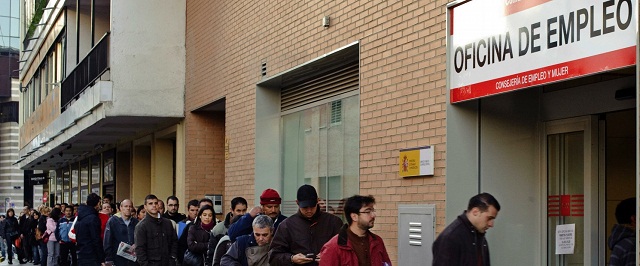Labour reform was meant to alleviate the massive job destruction by implementing a more flexible framework. And indeed employers have cashed full profit from the facilities to fire their workers. Indemnities still run high in comparison with other countries. But former hurdles that ransomed companies in accepting higher that legal standards for disposing of their manpower, have in most cases vanished.
As easy firing is linked to losses incurred over the last 12-month period, the new set of rules induces a perverse incentive to trigger labour restructuring before recovery closes this door.
The dole queues have swelled over the last quarters disavowing former pledges that reform would put an end to the daunting unemployment levels. Latest figures showing that 26% of labour force is out of work, hardly commend the major overhaul undertaken last year. Yet, the need to quell rigidities throttling economic performance was a must.
What went wrong? Recession has indeed taken a heavy toll by reducing prospects for investment and production. But the utter collapse in overall manpower is closely linked to two main shortcomings the reform was unable to cope with.
To begin with, incentives for introducing further flexibility at company level were disregarded. Collective bargaining was seen by government with deep mistrust, as the will to break trade unions’ back prevailed over the objective to ensure more balanced and stable labour relations. Social partners show a poor record in addressing the paramount goal of preserving jobs and promoting competitiveness. Sectors ring-fenced against market forces have indulged in fat salary increases even in these tough years. So, adjustment has been implemented by extensive enterprise closures and massive lay-offs. There is a clear need to mend this situation by increasing workers’ co-responsibility in business.
The other shortcoming stems from the dubious attempt to fight unemployment by maintaining time-contract jobs on a wide scale. This move has amplified duality in a highly inefficient labour market, putting an effective brake to stable hiring. Spill-over effects on training and skills have fuelled a downwards tendency in labour capabilities to adapt to more demanding requirements. Short term policy in this field fails to endow enterprises with high value human resources.
Time is likely to cure current ailments. But precious time has been lost in administering the right medicine: updating and reinforcing industrial relations at company level, securing more stable jobs and transforming the unemployment scheme in an efficient tool to incentive job search.






Be the first to comment on "How to cope with the Spanish unemployment"